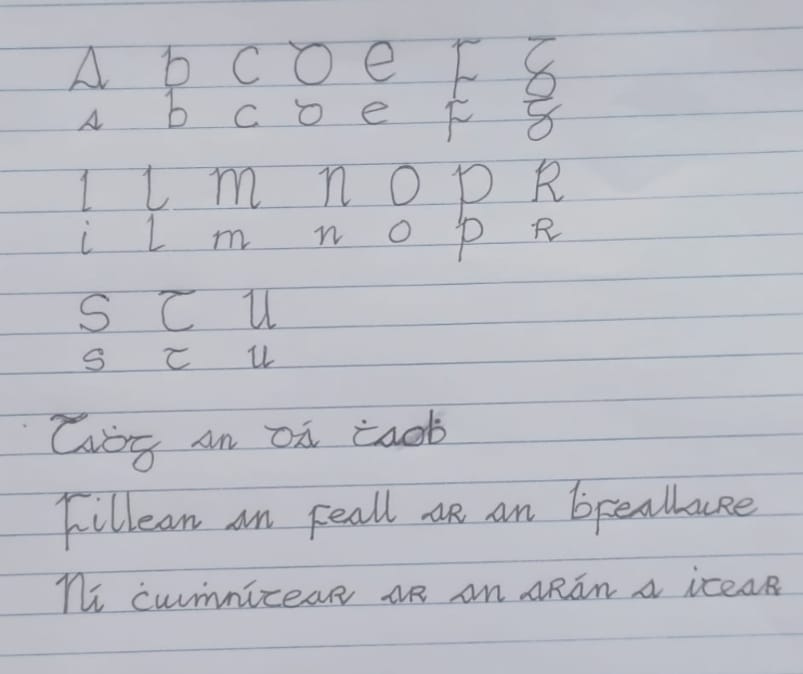I found this difficult to write not knowing how to begin and not knowing what I wanted to say. I must emphasise that I am not an expert but simply wish to share what prompted the beginnings of my journey to reconnect to my native tongue. Language contains the imprint of its culture, the good and the bad but the loss of it, risks loss of deep wisdom.
What prompted my disconnection?
Speaking Irish held so many negative associations arising from the deeper past linked as it was with poverty and dispossession. It was a language that was banned in the educational system and supplanted by English, the latter a language linked to transactional life and wealth that allowed interaction and expansion into a field of possibility beyond this impoverished nation. This I believe was imprinted within the psyche and is only unspooling now.
For me, there was also the abduction by republican nationalism of the Irish flag, music and language. I wanted no part of anything tinged with that violence, the death and destruction waged on the island, the daily radio soundtrack of my childhood and teens.
There was also our educational system and my reaction to it. Neither were balanced; me being the teenager who always disliked being coerced into participating in anything including compulsory Irish and on the other hand the didactic rote learning of grammar and of Irish poetry through translation into English that very effectively destroyed the texts, bleaching them of all colour. The system then (though improving now in all-Irish schools gaelscoilleanna) did not instill pride in Irish nor did it bring a recognition of its richness and the gift that comes with the ability to speak in many tongues.
What prompted my wish to reconnect?
It began a few years ago when one of my brothers who had hated Irish in school, did a course in Glencolmcille in Co Donegal and fell in love with it. That impulse came from spending time with native speakers and wanting to be part of a vivacious community. This was the key for me too; beginning to listen online to fluent Irish speakers, to the melody that can be heard especially in Donegal Irish. It moved me even though I understood little. Though a small nation there is huge variation in pronunciation and having had teachers from different parts mine is a mongrel mangled version. Exposure to welcoming people who live and love the language is key. Listening to and reading books by Manchan Mangan who places the language within its natural context (the folklore, myth, herbal remedies, maritime phrases) and easily switches from Irish to English enabled me to regain access to my heritage. Irish contains phrases for the smallest elements of landscape particular to time and place … the wind that blows around a headland or the sparkle on the water at a particular time of day…endless examples in a language that is deeply connected to nature, that reflects a particular attention to the present moment in a manner that I have not found in English.
Listening to my Sister Poets, their ease in switching between English and Romanian, Nepali and Afrikaans brought feelings of shame and sadness for my loss. It was inspirational to listen to their poetry and of poets from their places of origin. Read without translation it was revelatory to discover that though not understanding the words, sound and rhythm communicated an essence directly. So the question is do we understand poetry only with our minds or our hearts?
Languages inform and enrich each other. English is the language I use to communicate all my loves and interests, the language of the books I've loved. Much of the English spoken here in Ireland, especially by the older generations, has been flavoured liberally and deliciously by the Irish manner of speaking, its musicality, attitude, phrases and words What would you be doing that for? is a direct translation of what would be said in Irish. Words like flaithiúlach for generous a lovely big blousey sound that captures that expansiveness. There's a plethora of words for foolish, lazy people … the Irish have always been able to cut people down to size liúdramán amadán…. There's the phrase Anam cara which means soulmate, a phrase spread by the writings of John O'Donoghue, another great Irish writer and poet. Feelings rest on a person, a useful way to help retain a better relationship with feelings. They can pass through, are not fixed to an identity.: Tá áthas orm there is happiness on me, there's a terrible thirst on me … tá tart uafásach orm I'm dead with the thirst tá mé marbh leis an tart. I'm just after doing… …or another phrase for complaining is to give out the direct translation from Ag tabhairt amach.
Irish is such a beautiful language with a letter script all of its own but no longer taught in the seventies when I began school. Based on the Latin script used by the monks for scripture they adopted it to elevate the Irish language. I've attached an image.
I hope that the Irish influence remains in the English spoken here, the more I delve into writing the more I recognize the wonders of sound and meaning like a bell tolling in an empty church calling to communion. I wish to reinhabit my native language and all it informs; geography, placenames, history and myth. Finding my way back feeds my soul. Language is the cipher of life.





Great article Elaine, thanks for sharing
Go raibh maith agat Elaine ❣️ A very enriching article! It reminded me of when I was pregnant with Isabelle, my 99 % Irish daughter 🍀, how I started to learn a few Irish words and phrases on Duo Lingo 🥰